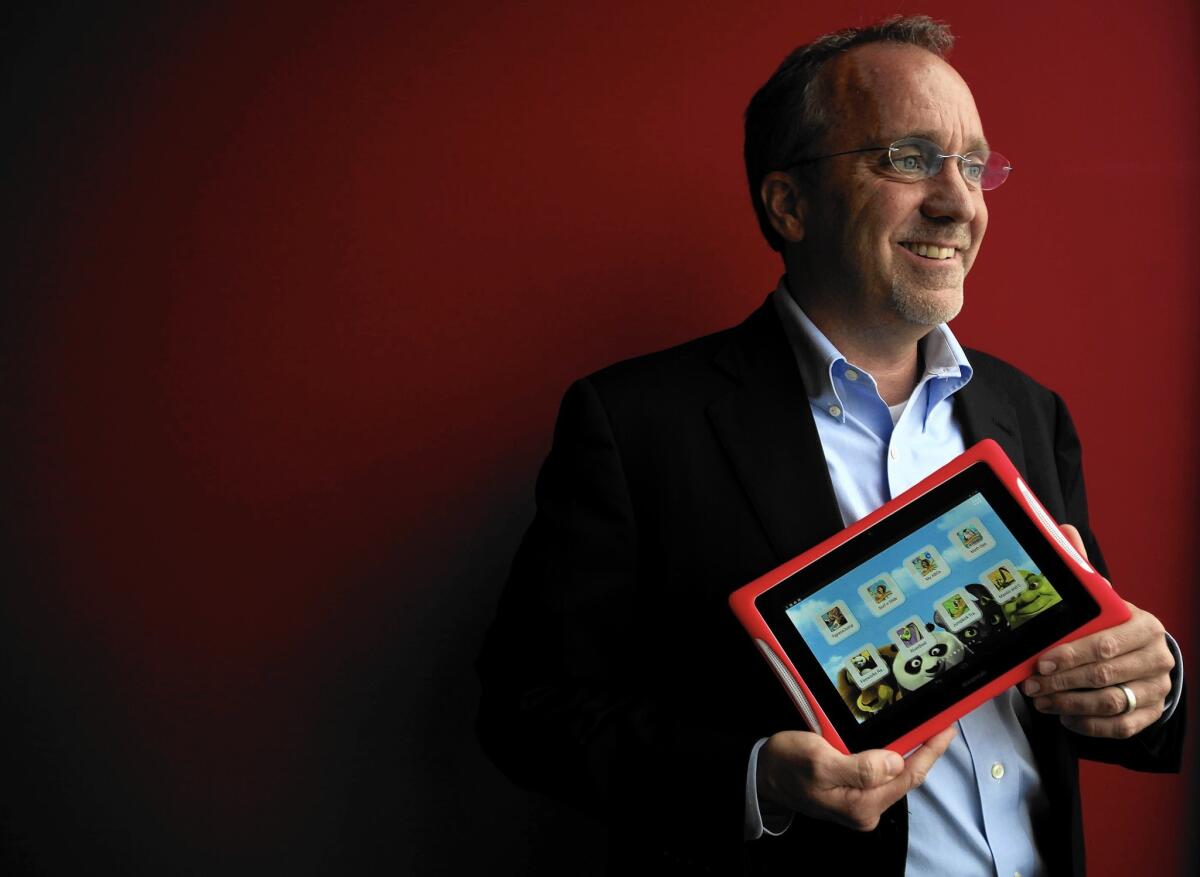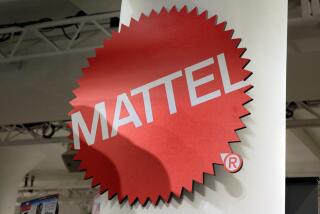Children’s tablet maker Fuhu files for bankruptcy, agrees to sale to Mattel

Fuhu CEO Jim Mitchell holds one of the El Segundo children’s tablet maker’s products in March 2014. He said Fuhu expects “to be able to satisfy ongoing obligations” with its proposed sale to Mattel.
- Share via
Children’s tablet maker Fuhu Inc. filed for Chapter 11 bankruptcy on Monday and agreed to a proposed $9.5-million sale to Mattel Inc.
The El Segundo company, known for its nabi-brand tablets, said in a U.S. Bankruptcy Court filing in Delaware that it has been crippled by a financial dispute with Foxconn, the big Taiwan-based contract manufacturer famous for supplying Apple’s iPhone. Foxconn has been Fuhu’s exclusive manufacturer since 2013.
Short on cash and inventory, Fuhu accepted a $300,000 loan from Mattel last week to fund bankruptcy proceedings. El Segundo-based Mattel said it agreed to purchase Fuhu as part of the deal, but other companies may still submit bids before a judge approves the proposal.
“We expect to be able to satisfy ongoing obligations to customers, vendors and employees pending the sale and ensure the bright future of the nabi franchise with the proposed acquisition,” Fuhu Chief Executive Jim Mitchell said in a statement.
He said the company would continue to ship tablets, provide support and honor existing gift cards and agreements. But the company needs quick help to make payroll and keep operating. Fuhu has about $2 million in cash, but its lender, an arm of Tennenbaum Capital Partners, has restricted the company’s access to it.
The tumble for Fuhu, which was named America’s fastest-growing company by Inc. Magazine in 2013 and 2014, underscores the challenges faced by just about every mobile device maker other than Apple Inc. Tablet sales generate razor-thin profits and competition is fierce.
Jason Moser, toy analyst at the Motley Fool, questioned why Mattel would be interested in getting into the fray. Although Mattel is pushing to add more digital components to its toys, going after a kid-oriented tablet company is not necessarily a shrewd move, he said. Tablet makers such as LeapFrog have struggled as kids outgrow their toys at a faster clip than ever before.
“Toys are much more short-lived than they were a generation ago,” Moser said. “There’s not really a reason for a consumer to go buy something like LeapFrog or [nabi] when they can go out and get” a tablet from Apple or Amazon that comes with good hardware and an entire ecosystem built around it.
“They will be fighting a very difficult uphill battle,” Moser said.
Mattel didn’t immediately respond to a request for comment.
Fuhu had been a leader among kids’ tablets companies, generating nearly $200 million in sales in 2013, according to court papers. The company has sold more than 4 million tablets since its founding in 2008 and employs 115 people. And it has been trying to boost profits through a subscription service, nabi Pass, that gives tablet owners access to a special library of apps, games and videos.
But Fuhu ran into trouble a year ago. Foxconn’s “mishandling” of tablets that were destined for Christmas shoppers last year caused them to come in late, Fuhu said in court documents. That set off a ripple effect that hit the company hard. Shoppers turned to other devices, while the late delivery left Fuhu with an oversupply of tablets early this year. Fuhu returned about $90 million worth of inventory to Foxconn and agreed to buy devices back as necessary.
A few months ago, Foxconn started demanding quicker payments, according to court filings. The two sides tried working out a deal. But by this fall, Foxconn cut off communications with Fuhu and suspended manufacturing of nabi devices, the court documents say.
Stores including Wal-Mart and Target have been scrambling to get their hands on nabi tablets, with some of them turning to rival brands as Fuhu ran out.
Foxconn declined to comment. The company tops the list of Fuhu creditors, owed more than $61 million. It also owns a minority stake in Fuhu, as do DreamWorks Animation, Intel Capital, LG Display Co. and several other hardware companies.
Court documents say Fuhu has talked with high-ranking executives at about 15 potential “strategic or financial buyers,” including nine firms with which talks have progressed to confidential information-sharing. About 500 potential bidders were initially contacted.
Twitter: @peard33
Twitter: @ByShanLi
More to Read
Inside the business of entertainment
The Wide Shot brings you news, analysis and insights on everything from streaming wars to production — and what it all means for the future.
You may occasionally receive promotional content from the Los Angeles Times.












